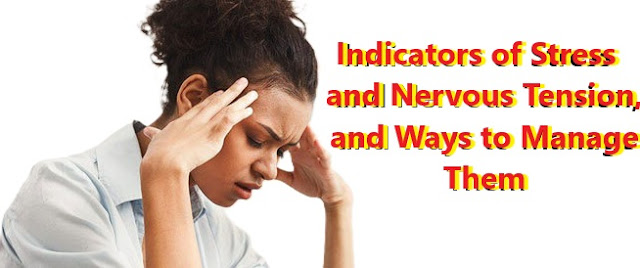Understanding Stress and Nervous Tension
Stress and nervous tension are responses our bodies have to challenging situations. These responses trigger both physiological and psychological changes designed to help us react effectively to perceived threats. However, chronic stress can become harmful and may lead to health issues. Recognizing indicators of stress and learning effective management techniques are essential for maintaining mental and physical health.
Indicators of Stress and Nervous Tension
1. Physical Indicators:
Headaches: Frequent headaches, especially tension headaches, can be a response to chronic stress.
Muscle Tension or Pain: Stress often causes muscles to tense up, leading to neck, shoulder, and back pain.
Digestive Issues: Symptoms like nausea, stomach cramps, constipation, or diarrhea can arise from stress.
Insomnia or Sleep Disturbances: Stress and anxiety can make it difficult to fall asleep, stay asleep, or reach restful sleep stages.
Increased Heart Rate and Blood Pressure: Stress can cause the heart rate and blood pressure to spike temporarily and, over time, may lead to more serious cardiovascular problems.
2. Emotional and Behavioral Indicators:
Irritability and Mood Swings: Increased frustration, irritability, and rapid mood changes are common signs of stress.
Difficulty Concentrating: Stress can make focusing on tasks and remembering details difficult.
Avoidance or Procrastination: Many people try to avoid stressors by putting off tasks, which can lead to a cycle of procrastination and guilt.
Substance Use: Increased alcohol, smoking, or drug use can be a coping mechanism for stress.
Social Withdrawal: Individuals may avoid social situations, isolate themselves, or neglect relationships when feeling overwhelmed.
Causes of Stress and Nervous Tension
Understanding the root causes can help in managing stress effectively. Common stressors include:
Work-related stress: Deadlines, job insecurity, and high expectations contribute to stress.
Financial Concerns: Financial instability, debt, or managing expenses can be a significant stressor.
Family and Relationships: Conflict, lack of support, or high expectations in personal relationships can cause stress.
Health Issues: Chronic illnesses or caring for a sick family member are also common stress triggers.
Major Life Changes: Moving, changing jobs, or dealing with loss are stressful events that can impact mental well-being.
Effective Methods for Managing Stress and Nervous Tension
1. Physical Exercise:
Regular physical activity, such as walking, jogging, or yoga, releases endorphins, known as “feel-good” hormones, and can significantly reduce stress.
2. Mindfulness and Meditation:
Practicing mindfulness or meditation techniques can help the mind focus on the present moment, reducing anxiety and stress. Even 10 minutes a day can be beneficial.
3. Breathing Techniques:
Deep breathing exercises, such as diaphragmatic breathing, can help calm the nervous system, lower heart rate, and reduce the body’s stress response.
4. Balanced Diet and Hydration:
Eating a well-balanced diet rich in fruits, vegetables, and whole grains can boost overall health and reduce the physiological effects of stress. Staying hydrated also plays a role in maintaining mental clarity and energy levels.
5. Adequate Sleep:
Aiming for 7-8 hours of quality sleep can help the body and mind recover, making it easier to handle stress during the day.
6. Time Management and Goal Setting:
Breaking tasks into smaller, manageable goals can prevent feeling overwhelmed and reduce procrastination. Prioritizing tasks helps in focusing on what's truly important.
7. Social Support:
Talking to friends, family, or a mental health professional about stress can provide emotional support and may offer new perspectives on managing challenges.
8. Cognitive Behavioral Therapy (CBT):
CBT is a proven method in psychotherapy that focuses on changing negative thought patterns that contribute to stress. Working with a therapist, individuals learn techniques to identify and manage stress triggers.
9. Reducing Caffeine and Alcohol:
While some turn to caffeine and alcohol for temporary relief, excessive intake can increase anxiety, disrupt sleep, and worsen stress symptoms.
10.Developing Hobbies:
Engaging in enjoyable activities like reading, painting, cooking, or other hobbies can help divert focus from stressors and improve mood.
Conclusion
Stress and nervous tension are common responses to life’s challenges, but they don't have to control us. Recognizing the signs and applying effective stress management techniques can significantly improve our quality of life. By incorporating a mix of physical, mental, and social strategies, we can build resilience and navigate stress with greater ease. If stress feels unmanageable, seeking professional help is always a wise step.

